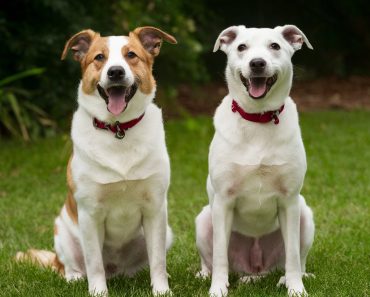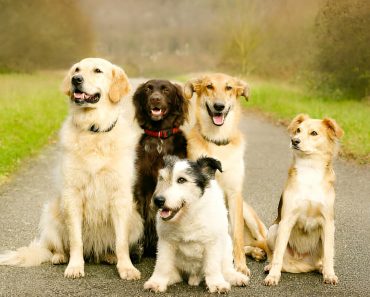
Golden Retrievers are beloved for their friendly demeanor, intelligence, and loyalty. In this comprehensive guide, we’ll explore everything you need to know about this wonderful breed, from their history and temperament to training tips and health considerations.
-
History and Origins
- Breed Origins: Developed in Scotland during the 19th century, they were initially bred for retrieving game during hunting expeditions.
- Breeding Purpose: The breed was created by crossing various retrievers, spaniels, and other breeds to create a dog with excellent retrieving abilities, a gentle mouth, and a friendly disposition.
-
Physical Characteristics
- Appearance: Golden Retrievers are medium to large-sized dogs with a sturdy build and a dense, water-repellent coat. Their coat ranges from light to dark gold and requires regular grooming to prevent mats and tangles.
- Size and Proportions: Adult males typically stand between 22-24 inches tall at the shoulder and weigh between 65-75 pounds, while females are slightly smaller, standing 20-22 inches tall and weighing 55-65 pounds.
-
Temperament and Personality
- Friendly and Affectionate: they are known for their gentle and friendly nature, making them excellent family pets and companions.
- Intelligent and Eager to Please: They are highly intelligent dogs that thrive on positive reinforcement training methods and enjoy learning new tasks and tricks.
-
Training and Obedience
- Basic Commands: Start training your Golden Retriever as soon as you bring them home, focusing on basic commands such as sit, stay, come, and heel.
- Advanced Training: Golden Retrievers excel in obedience trials, agility competitions, and as therapy or service dogs due to their intelligence and trainability.
-
Exercise and Activity Needs
- Daily Exercise: Golden Retrievers are energetic dogs that require regular exercise to maintain their physical and mental well-being. Aim for at least 30-60 minutes of moderate to vigorous activity each day.
- Outdoor Activities: They enjoy activities such as fetch, swimming, hiking, and running alongside their owners.
-
Health Considerations
- Common Health Issues: While generally healthy, Golden Retrievers are prone to certain genetic health conditions, including hip dysplasia, elbow dysplasia, and progressive retinal atrophy.
- Regular Vet Check-ups: Schedule regular veterinary check-ups to monitor your Golden Retriever’s health and address any potential issues promptly.
-
Diet and Nutrition
- Balanced Diet: Feed your canine a high-quality dog food that is appropriate for their age, size, and activity level. Avoid overfeeding to prevent obesity, which can lead to health problems.
- Special Dietary Considerations: Some Golden Retrievers may have food allergies or sensitivities, so it’s essential to choose a diet that meets their specific needs.
-
Grooming and Coat Care
- Brushing: Their double coat requires regular brushing to remove loose hair and prevent mats and tangles. Brushing several times a week is recommended, with more frequent grooming during shedding seasons.
- Bathing: Bathe your Golden Retriever as needed, using a mild dog shampoo to keep their coat clean and healthy without stripping away natural oils.
-
Socialization and Interaction
- Early Socialization: Introduce your Golden Retriever to a variety of people, animals, and environments from a young age to help them develop into well-adjusted and confident adults.
- Positive Experiences: Make socialization a positive experience by rewarding your dog with treats, praise, and playtime during new encounters.
-
Adoption and Rescue
- Adopting a Golden Retriever: Consider adopting from a rescue organization or shelter to provide a loving home to a dog in need. Many Golden Retrievers end up in shelters due to changes in their owners’ circumstances.
- Rescue Organizations: Research reputable rescue organizations that specialize in Golden Retrievers and follow their adoption process to find the perfect match for your family.
-
Behavioral Training and Management
- Positive Reinforcement: Utilize positive reinforcement techniques such as treats, praise, and play to reinforce desired behaviors and discourage unwanted ones.
- Consistency and Patience: they respond best to consistent training methods and patient guidance. Avoid punishment-based training, as it can damage the bond between you and your dog.
-
Mental Stimulation and Enrichment
- Interactive Toys: Provide your Golden Retriever with puzzle toys, interactive feeders, and chew toys to keep them mentally engaged and prevent boredom.
- Training Games: Incorporate training games and activities into your daily routine to challenge their intellect and strengthen the bond between you and your dog.
-
Traveling with Your Golden Retriever
- Preparation: Before traveling with your Golden Retriever, ensure they are comfortable with car rides by taking short trips and gradually increasing the duration.
- Safety Measures: Use a secure crate or harness to restrain your dog in the car and pack essentials such as food, water, medications, and familiar toys for the journey.
-
Golden Retriever Health and Wellness
- Regular Exercise: Engage your Golden Retriever in regular exercise to maintain their physical health and prevent obesity, which can contribute to joint problems and other health issues.
- Annual Veterinary Check-ups: Schedule annual wellness exams with your veterinarian to monitor your dog’s overall health and detect any potential health concerns early.
-
Training for Specific Activities

- Therapy Dog Training: Golden Retrievers make excellent therapy dogs due to their friendly disposition and empathy. Consider enrolling your dog in therapy dog training classes to become certified.
- Service Dog Training: Some Golden Retrievers are trained to assist individuals with disabilities, such as guide dogs for the visually impaired or mobility assistance dogs for those with physical limitations.
-
Golden Retriever Breeding Considerations
- Ethical Breeding Practices: Choose a reputable breeder who prioritizes the health and temperament of their breeding stock and performs health screenings to minimize the risk of genetic disorders.
- Responsible Ownership: Responsible breeding goes hand in hand with responsible ownership. Ensure you are prepared to provide a lifelong commitment to your Golden Retriever before bringing a puppy into your home.
-
Golden Retriever Community and Resources
- Breed Clubs: Join Golden Retriever breed clubs and online communities to connect with other owners, share experiences, and access resources on training, health care, and breed-specific activities.
- Educational Resources: Take advantage of books, articles, and reputable websites dedicated to Golden Retriever care and training to expand your knowledge and enhance your relationship with your dog.
-
Recognizing and Addressing Behavioral Issues
- Separation Anxiety: Golden Retrievers are prone to separation anxiety when left alone for extended periods. Implement strategies such as gradual desensitization and providing enrichment activities to alleviate their distress.
- Aggression and Reactivity: Address aggressive behavior through positive reinforcement training techniques and seek guidance from a certified behaviorist or trainer if needed.
-
Longevity and Aging in Golden Retrievers
- Senior Care Needs: As they age, they may require adjustments to their diet, exercise routine, and veterinary care to accommodate changes in mobility, vision, and overall health.
- Quality of Life Considerations: Monitor your senior Golden Retriever’s quality of life closely and consult with your veterinarian about palliative care options to ensure they remain comfortable and content in their golden years.
-
Legacy and Impact
- Service to Society: Reflect on the invaluable contributions Golden Retrievers have made as therapy dogs, service dogs, search and rescue dogs, and beloved family pets, bringing joy and comfort to countless individuals and families.
- Advocacy and Education: Advocate for responsible pet ownership and breed stewardship to ensure that future generations of Golden Retrievers continue to embody the breed’s exceptional qualities and enrich the lives of those they touch.
-
Nutrition and Feeding Requirements
- Balanced Diet: Provide your dog with a balanced diet that meets their nutritional needs. Look for high-quality dog food with real meat as the primary ingredient and avoid artificial additives and fillers.
- Portion Control: Feed your Golden Retriever measured portions according to their age, weight, and activity level to prevent obesity and maintain a healthy body condition.
- Special Dietary Considerations: Some Golden Retrievers may have food allergies or sensitivities, requiring a specialized diet.
-
Preventative Health Care
- Vaccinations: Follow a regular vaccination schedule recommended by your veterinarian to protect your Golden Retriever from common infectious diseases such as rabies, distemper, and parvovirus.
- Parasite Control: Administer preventive medications for fleas, ticks, and heartworms as recommended by your veterinarian to protect your dog from parasitic infestations and diseases.
-
Golden Retriever Breeding and Reproduction
- Responsible Breeding Practices: If you plan to breed your Golden Retriever, ensure you understand the responsibilities involved in ethical breeding. Select breeding pairs carefully, considering health, temperament, and genetic diversity.
- Breeding Considerations: Work with a reputable veterinarian and breeding mentor to oversee the breeding process, from health screenings and genetic testing to prenatal care and whelping assistance.
-
Golden Retriever Exercise and Activity Recommendations
- Physical Exercise: Engage your friend in regular physical activity to maintain their muscle tone, cardiovascular health, and mental well-being. Activities such as walking, jogging, hiking, and swimming are excellent options.
- Mental Stimulation: In addition to physical exercise, provide your Golden Retriever with mental stimulation through interactive toys, puzzle games, and training sessions to prevent boredom and encourage mental agility.
-
Golden Retriever Behavior and Training Challenges
- Barking: Address excessive barking through positive reinforcement training techniques, such as teaching the “quiet” command and providing distractions or alternatives to barking.
- Digging: Redirect your dog’s digging behavior by providing designated digging areas or interactive toys to satisfy their natural instincts in a constructive manner.
-
Golden Retriever Senior Care and Support
- Senior Health Monitoring: Schedule regular veterinary check-ups for your senior Golden Retriever to monitor for age-related health issues such as arthritis, cognitive decline, and dental problems.
- Nutritional Support: Consider switching to a senior-specific dog food formulated to meet the nutritional needs of older dogs, including joint support, digestive health, and cognitive function.
-
Travel Tips for Golden Retriever Owners
- Car Travel: Secure your canine safely in the car using a harness, crate, or pet seatbelt to prevent injury during travel. Offer breaks for bathroom breaks, exercise, and hydration on long journeys.
- Air Travel: Research airline policies and regulations regarding pet travel, including crate requirements, health certificates, and temperature restrictions, before booking flights with your friend.
-
Community and Advocacy
- Breed Advocacy: Support Golden Retriever breed clubs, rescue organizations, and advocacy groups dedicated to promoting responsible ownership, breed stewardship, and breed-specific legislation.
- Education and Outreach: Participate in breed education events, community outreach programs, and social media campaigns to raise awareness about welfare, health, and responsible breeding practices.
-
Golden Retriever End-of-Life Care and Bereavement
- Quality of Life Assessment: Monitor your aging or ill friend’s quality of life closely, assessing factors such as pain, mobility, appetite, and enjoyment of daily activities to make informed decisions about end-of-life care.
- Grief Support: Seek support from veterinarians, pet loss support groups, and online resources to navigate the grieving process and honor the memory of your beloved companion.
-
Celebrating the Golden Retriever
Golden Retrievers hold a special place in the hearts of dog lovers worldwide, cherished for their gentle nature, unwavering loyalty, and boundless affection. By providing them with love, care, and companionship throughout their lives, you can ensure that your canine enjoys a fulfilling and enriched existence as a beloved member of your family. Whether as a loyal companion, a dedicated service dog, or a cherished therapy animal, they continue to bring joy, comfort, and companionship to people of all ages and walks of life.
Conclusion

Golden Retrievers are more than just pets; they are cherished members of the family and valuable contributors to society. Their friendly disposition, intelligence, and versatility make them beloved companions, therapy dogs, and working partners. By understanding their needs and providing them with love, care, and training, you can ensure that your canine enjoys a fulfilling and enriching life as a cherished member of your household. Celebrate the unique bond you share with your Golden Retriever and treasure the memories you create together, knowing that you have provided them with a life filled with love, happiness, and purpose.






